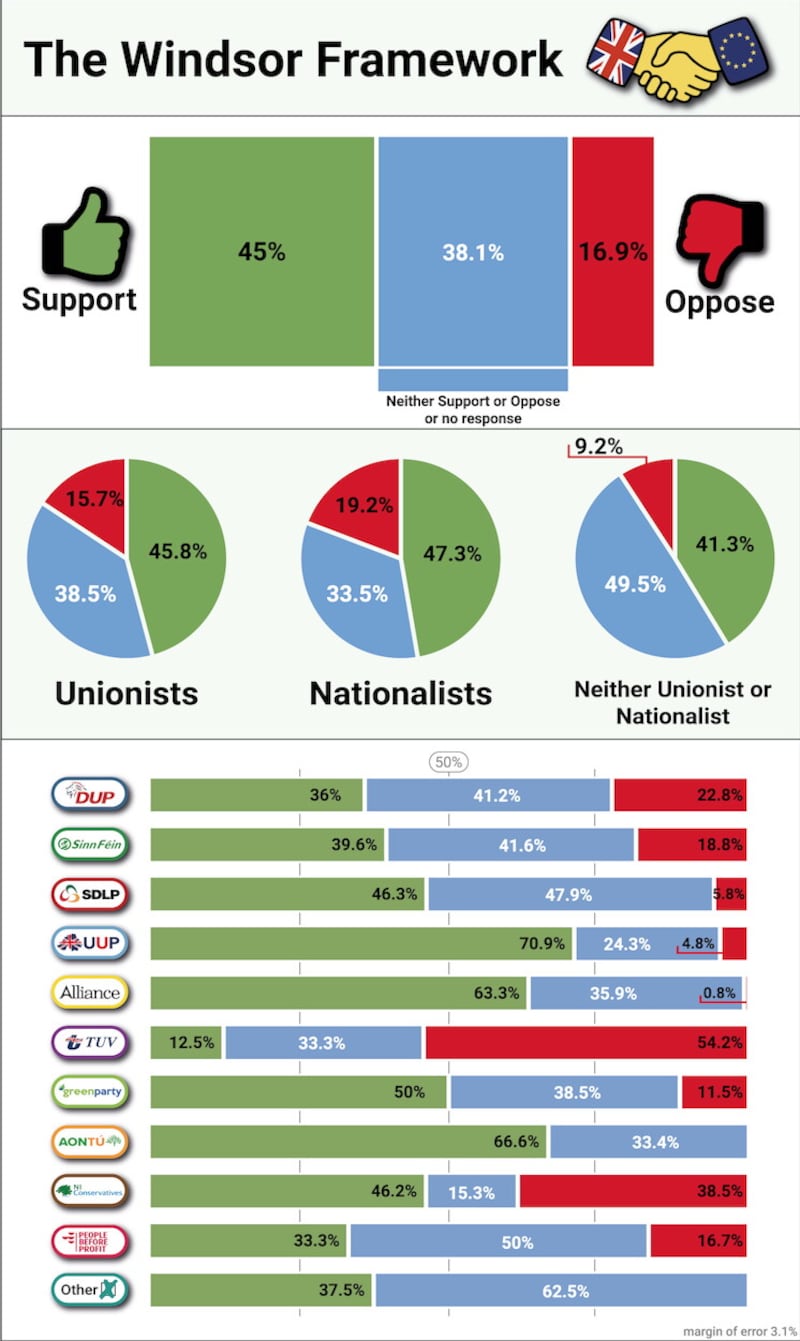SUPPORT for the Windsor Framework among the north's voters outstrips opposition to the EU-UK deal by almost three-to-one, according to freshly published data.
Those rejecting the revised post-Brexit trading arrangements outright amount to 16.9 per cent, while 45 per cent support the agreement announced last month.
Around a third of respondents to The Irish News-Institute of Irish Studies-University of Liverpool survey neither rejecting or endorsing the deal.
The results of the survey, which was carried out between March 3-14, come as MPs prepare to take part on what is widely regarded as an indicative vote on the new trading arrangements. The DUP has signalled that it will vote against the British government with leader Sir Jeffrey Donaldson insisting "outstanding issues" remain.
Read More
- Majority urge DUP back into government – poll
- Poll reveals overwhelming cross-community support for protocol's dual market access
- Half of voters believe rigorous implementation calls overlooked need for protocol renegotiation
- Analysis: Poll points to potential route out of self-inflicted mess
- Prof Peter Shirlow: Realising the achievements needs leadership
When asked between March 3-14 if they were opposed to the Windsor Framework, little more than one-in-five (22.8 per cent) of DUP voters agreed, with 36 per cent disagreeing. One third of DUP supporters (33 per cent) neither agreed or disagreed.
Less than one-in-20 Ulster Unionist supporters (4.8 per cent) rejected the framework, while more than two-thirds (70.9 per cent) said they were not opposed to it.

Ulster Unionist leader Doug Beattie yesterday gave the February 27 deal qualified acceptance, saying the best place to "meet the opportunities and challenges of the Windsor Framework head on" was in a restored Stormont.
TUV voters appear most entrenched in their opposition to the revised protocol, with more than half (54.2 per cent) rejecting it and just 12.5 per cent indicating support. However, almost one-third of those backing Jim Allister's party have not made their mind up.
In all, just 15.7 per cent of unionists were opposed to the recent deal, with 45.8 per cent accepting it and 28.9 per cent neither agreeing nor disagreeing.
The level of support for the framework among nationalists is slightly higher than among unionists at 47.3 per cent though, opposition is greater too at 19.2 per cent, with one quarter (24.5 per cent) yet to decide.
Barely one-in-20 SDLP voters reject the deal (5.8 per cent), while almost one-fifth of their Sinn Féin counterparts think likewise (18.8 per cent). Some 46.3 per cent of SDLP supporters back the revised post-Brexit trade arrangements, compared to 39.6 per cent of Sinn Féin voters. Notably, 39.1 per cent of those backing Colum Eastwood's party neither endorse or reject the deal, with 36.7 per cent of Sinn Féin supporters also undecided.
Almost two-thirds of Alliance voters (63.3 per cent) back the framework while just 0.8 per cent reject it and 21.4 per cent neither agree nor disagree.
Professor Peter Shirlow, director of the Institute of Irish Studies, said TUV voters were the only group demonstrating majority opposition to the Windsor Framework.
"DUP voters compared to TUV supporters are three times more likely to support the Windsor Framework, while Sinn Féin voters are near as likely to oppose it," he said.
"What is also important to note is the share of survey respondents who neither agree or disagree – this could be due to many factors from disinterest through lacking knowledge of the framework to simply knowing there is improvement and wondering if it meets unionist concerns."
:: The survey was conducted between March 3-14 and has a margin of error of +/– 3.1 per cent.
Read More
- Opinion poll: Stormont's 'big three' consolidate dominance of the assembly
- Analysis: Big party support holds up but voters want action from restored executive
- Cost of living and NHS reform identified as major priorities for restored Stormont
- Majority support for Good Friday Agreement structures among voters
- Dr David McCann – The three-party state is here to stay
- Dr Sean Haughey – We need to talk about restoring and reforming devolution






